 Do you want a way to grow your list, get better feedback or increase user-generated content?
Do you want a way to grow your list, get better feedback or increase user-generated content?
Do you use Facebook giveaways and contests to collect information about your fans?
Action-gated Facebook campaigns require users to share specific data or feedback before they can enter a giveaway or contest.
In this article I'll show you the concept of action-gating and how three companies are using it effectively to meet their goals.
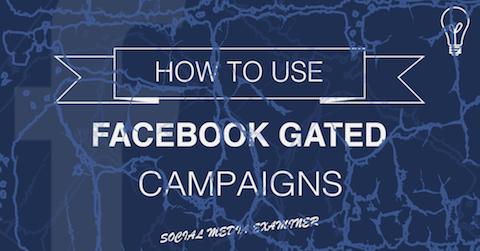
Why Facebook Gated Campaigns?
Facebook gated campaigns use a pretty simple idea called action-gating: A company offers a prize in exchange for personal data (like an email address or zip code).
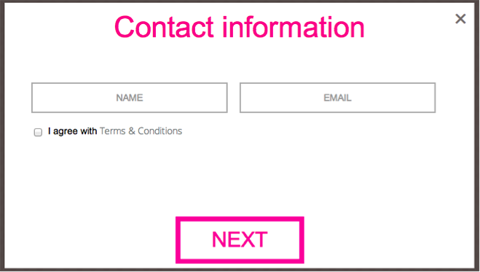
Action-gated campaigns are hosted on your Facebook page via a third-party app instead of as a stand-alone update. These campaigns aren't for collecting general comments under a status update; they're for collecting specific demographic or contact information.
Action-gated campaigns require users to complete a specific task in exchange for something valuable from your brand, like access to or extra entries in a promotion, access to a coupon, etc. The user's task may be filling out a form, uploading content, voting, etc.
Simply asking people to like your page (known as like-gating or fan-gating) to have access to your campaign doesn't collect data you can use for business planning purposes (as you'll see in #1 below) or future contact. Likes don't get you extra content you can use across your other social channels to gain more attention. Action-gating does.
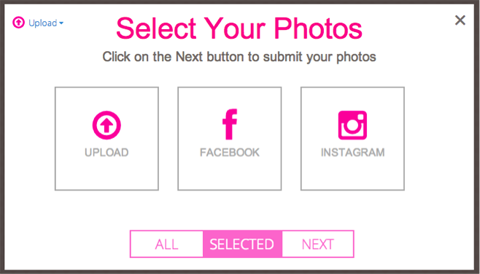
Below I discuss three examples of companies using action-gating to gather valuable information from their fans and followers.
#1: Collect Location Data
Uber and The Honest Company are examples of companies partnering to host an action-gated giveaway. Rather than using a like-gating tactic, they opened entries to anyone, whether that person likes either page or not.
Each business page posted a series of status updates with a link to the entry page. When users clicked the link, they were taken to a form built to require people to share their name, email address, date of birth and zip code in order to enter. (Of course, they could also like the Uber or The Honest Company's page, but it wasn't a requirement for entry.)
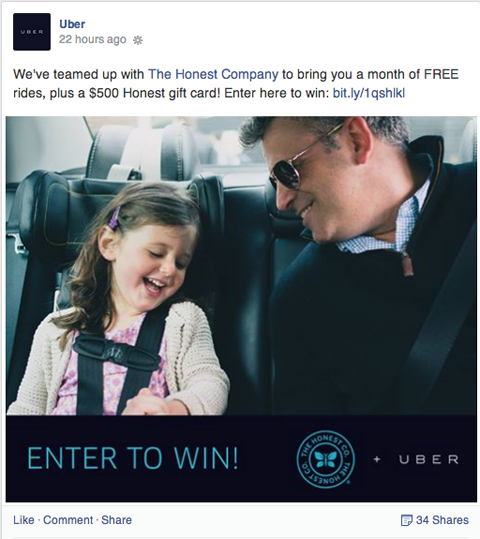
Sharing that much personal information is quite a hoop to jump through, but the prize is worth $500. When a prize has high value, people are more willing to share their information.
With that valuable fan data in hand, Uber and The Honest Company learn where their fans live.
Get World-Class Marketing Training — All Year Long!
Are you facing doubt, uncertainty, or overwhelm? The Social Media Marketing Society can help.
Each month, you’ll receive training from trusted marketing experts, covering everything from AI to organic social marketing. When you join, you’ll also get immediate access to:
- A library of 100+ marketing trainings
- A community of like-minded marketers
- Monthly online community meetups
- Relevant news and trends updates

Discover Proven Marketing Strategies and Tips
Want to go even deeper with your marketing? Check out the Social Media Marketing Podcast! Publishing weekly since 2012, the Social Media Marketing Podcast helps you navigate the constantly changing marketing jungle, with expert interviews from marketing pros.
But don’t let the name fool you. This show is about a lot more than just social media marketing. With over 600 episodes and millions of downloads each year, this show has been a trusted source for marketers for well over a decade.
But wait. Can't you get that same information from Facebook Insights? Well, yes, you can see the location of your fans by city, but collecting specific information like zip codes takes location data a step further.
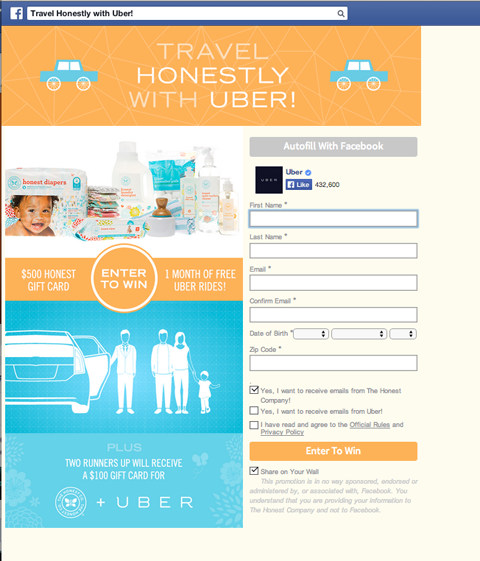
The collected zip codes allow Uber to identify neighborhoods that could be targets for expansion and gives The Honest Company (which makes natural baby and home-care products) insights into which retail outlets their salespeople should call on.
That kind of targeting is much more valuable than a plain old like.
#2: Gather User-Generated Content
Few companies do a better job of encouraging (and getting) user-generated content than GoPro. The fan-submitted videos often get shared and commented on like crazy.
To get customers and fans to share footage they've shot using a GoPro camera, the company has an action-gated Facebook campaign called the GoPro Creator's Challenge.
For a chance to win $5,000 and have their video featured on the GoPro Network, fans have to upload a video entry.
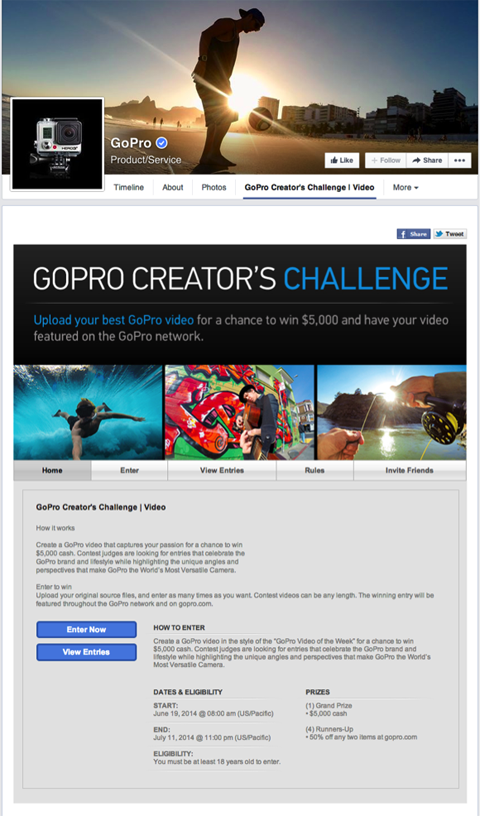
Shooting and uploading a video is more work than, say, answering a few questions on a survey, but the opportunity to win five grand makes the task worthwhile.
Keep in mind that GoPro doesn't force users to like their page in order to enter the Creator's Challenge. They're assuming that people who genuinely love their brand and products will like the page because they want to.
GoPro's personal reward comes in the form of high-quality video they can feature on their YouTube channel (which has more than two million subscribers), Twitter, Facebook and other social profiles.
#3: Round Up Potential Leads
Clothing retailer Lulu's hosts a daily sweepstakes on their Facebook page. Their idea and execution are simple: Ask people to find a product on the Lulu's website for a chance to win a $50 store credit.
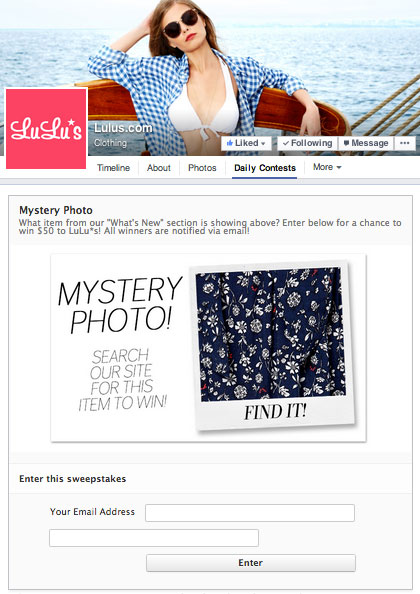
The feedback they get helps them determine what customers want to see more of. The beauty of this simple action-gated campaign is that any brand can do it.
Lulu's uses a straightforward question that requires a short answer—a tactic that ensures a better response rate.
Also note how Lulu's asks users for specific feedback—they steer entrants away from general comments. There's no confusion on the user's end and the task feels more like a creative break than tackling a homework assignment.
Lulu's also collects email addresses as part of each entry so they can follow up with people outside of Facebook. This tactic is useful for a company like Lulu's—or any company, really—because it lets them follow up via a customized email with a special deal.
Over to You
Action-gating offers more flexibility and value than a simple like-gated giveaway or contest. Collecting users' personal data and feedback is just one way to use action-gating. You can also expand your reach by asking users to tweet about your campaign or share it on Google+ as an entry.
The key to successful Facebook gated campaigns is offering a significant prize that justifies the requirement for entry. The more you're asking for, the more you have to offer in return.
What do you think? Have you used action-gating in a Facebook campaign? Will you try it in the future? Leave your comments below.
Attention Agency Owners, Brand Marketers, and Consultants

Introducing the Marketing Agency Show–our newest podcast designed to explore the struggles of agency marketers.
Join show host and agency owner, Brooke Sellas, as she interviews agency marketers and digs deep into their biggest challenges. Explore topics like navigating rough economic times, leveraging AI, service diversification, client acquisition, and much more.
Just pull up your favorite podcast app, search for Marketing Agency Show and start listening. Or click the button below for more information.

